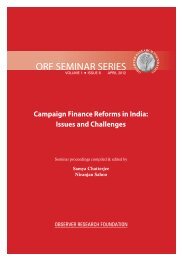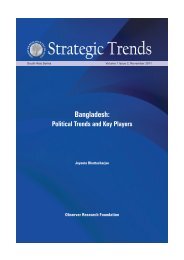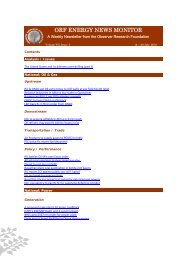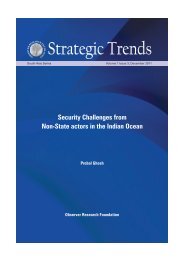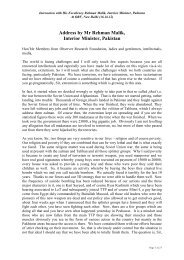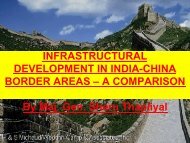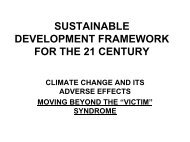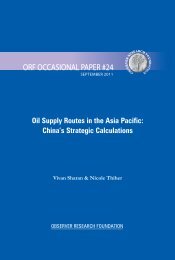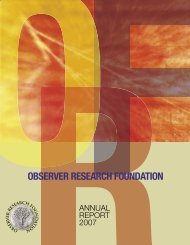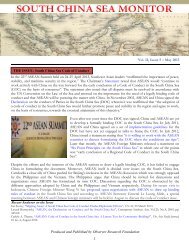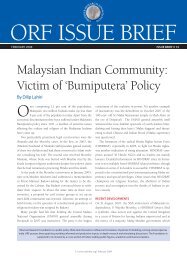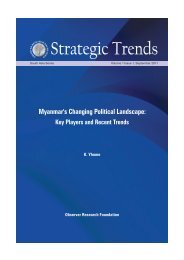Campaign Finance Reforms in India: Issues and Challenges
Campaign Finance Reforms in India: Issues and Challenges
Campaign Finance Reforms in India: Issues and Challenges
Create successful ePaper yourself
Turn your PDF publications into a flip-book with our unique Google optimized e-Paper software.
ORF Sem<strong>in</strong>ar Series<br />
fund<strong>in</strong>g with the c<strong>and</strong>idate, it says it is just propagat<strong>in</strong>g the party programmes,<br />
then it falls outside the spend<strong>in</strong>g limit for a c<strong>and</strong>idate.<br />
The comb<strong>in</strong>ation of what happened <strong>in</strong> 1969 <strong>and</strong> then <strong>in</strong> 1975 was that you had<br />
no adequate legal source of spend<strong>in</strong>g till corporate-fund<strong>in</strong>g was re<strong>in</strong>troduced as<br />
legal <strong>in</strong> 1985; you had a highly regulated economy where the licence raj was very<br />
much <strong>in</strong> place; you also had unlimited party-spend<strong>in</strong>g, which meant that you had<br />
an arms race between parties at the time of elections. Even the re-<strong>in</strong>troduction<br />
of corporate-fund<strong>in</strong>g <strong>in</strong> 1985 really made no difference because by that time the<br />
dependence on unaccounted money had become deeply entrenched <strong>in</strong> the<br />
system; also, until 2003, there was no tax <strong>in</strong>centive. There was the fear of lack of<br />
anonymity, <strong>and</strong> of be<strong>in</strong>g penalised by the party which you did not fund, if it<br />
came to power some time <strong>in</strong> the future. So, the entrenchment of political parties<br />
<strong>in</strong> the unaccounted economy became very deep. Although, as Mr. Manish<br />
Tewari said, the 2003 amendments have <strong>in</strong>troduced a degree of transparency,<br />
<strong>and</strong> more <strong>and</strong> more companies are now contribut<strong>in</strong>g by cheque <strong>and</strong> claim<strong>in</strong>g<br />
tax-deduction, it is still a small percentage of the actuals.<br />
Now, what do we do about this? As I said at the beg<strong>in</strong>n<strong>in</strong>g, there are four types<br />
of regulation of elections <strong>and</strong> parties: limits on expenditures, limits on<br />
contributions like <strong>in</strong> the US <strong>and</strong> public-fund<strong>in</strong>g of some k<strong>in</strong>d or the other. It<br />
can be designed <strong>in</strong> various ways <strong>and</strong> forms with different types of report<strong>in</strong>g <strong>and</strong><br />
disclosure requirements. So, <strong>in</strong> pr<strong>in</strong>ciple, one way is to tightly monitor<br />
expenditure <strong>and</strong> also l<strong>in</strong>k it to a tight monitor<strong>in</strong>g of contributions, like what Mr<br />
Arun suggested. But you have other systems also. In the US, there is no limit on<br />
expenditure, but it is relatively clean. You don't have this k<strong>in</strong>d of corruption<br />
because there are very strict report<strong>in</strong>g <strong>and</strong> disclosure requirements.<br />
Remove what is basically a farcical cap on expenditure. Why have c<strong>and</strong>idate-<br />
limits of ` 40 lakh when you exempt parties, <strong>and</strong> effectively make it a<br />
mean<strong>in</strong>gless limit. Why have it all then? Do away with it <strong>and</strong> focus on hav<strong>in</strong>g<br />
strict disclosure. There are cash <strong>and</strong> unaccounted contributions; even if you<br />
28<br />
www.orfonl<strong>in</strong>e.org



